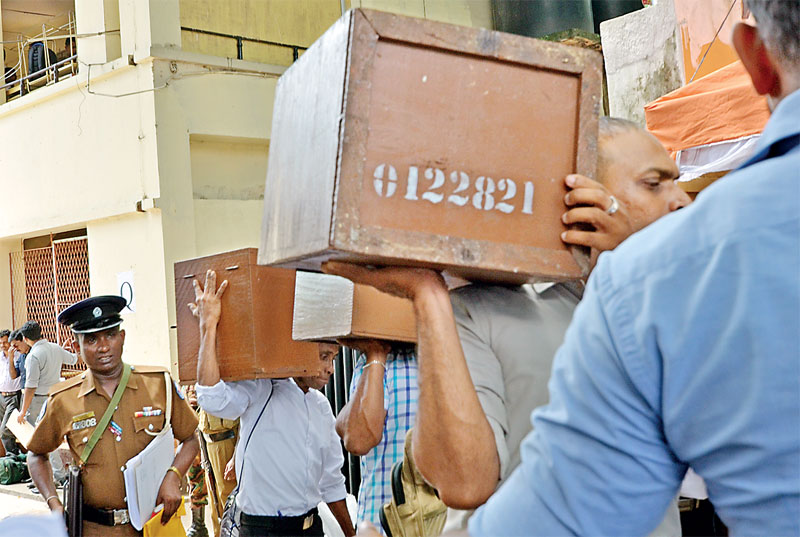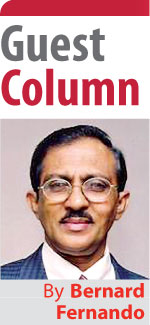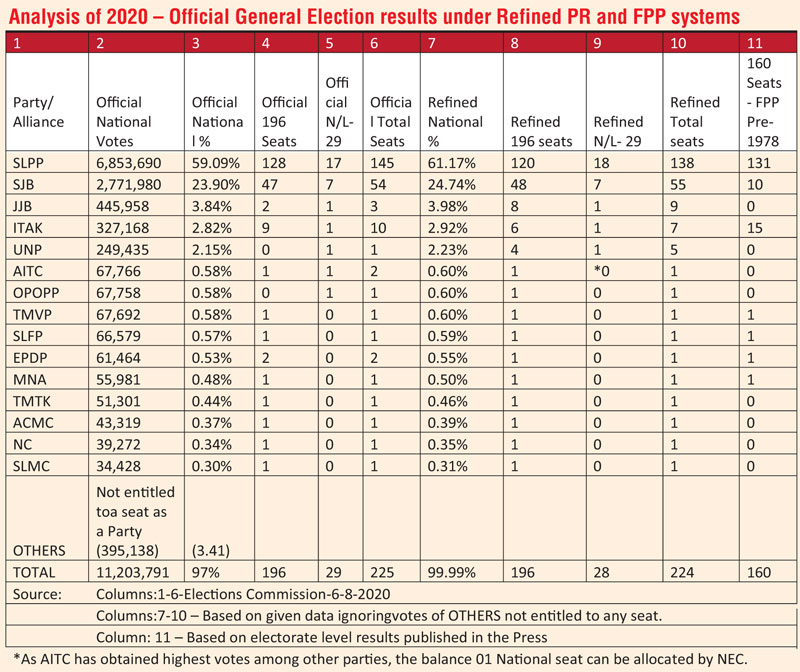Wednesday Feb 18, 2026
Wednesday Feb 18, 2026
Thursday, 2 December 2021 00:20 - - {{hitsCtrl.values.hits}}

As a small and democratic country, we should be able to exhibit the simplicity, rationality, accuracy, transparency and credibility of our electoral process as a model to the world at large rather than copying complex and irrelevant systems from abroad – Pic by Shehan Gunasekara
 1.0 Preface
1.0 Preface
At the outset, the writer as a sovereign voter for 57 years, wishes to thank the author of the captioned article for creating a press window to vent an alternate perspective on ‘electoral reforms’ in Sri Lanka.
Geographically and politically, Sri Lanka is a small democracy with a long and proud history marred by foreign invasions leading to the present multi-ethnic/cultural/religious nature of our population. However, even after 73 years of independence it has failed to introduce a ‘voter-friendly’ electoral system of its own anvil for its sovereign voters and the country. As a result, we are yet to be blessed with educated, genuine and truly patriotic ‘political professionals’ who can both develop and govern the country as our honourable and effective representatives.
With a population of around 22 million, we had over 16.26 million registered sovereign voters at the most successful 2020 General Election, but according to the results only 71.3% of those voters had shown a candid interest to cast a valid ballot. Besides, the basis on which some of those who cast valid votes too appear to be irrational due to their devoted/blind inclinations towards personalities over the more important ‘Election manifestos’ which unfortunately have been set aside by the voters due to whimsical and false promises.
It is quite evident that, voter passivity was due to lack of proper knowledge of the complex electoral system and the poor quality of politicians being produced to date. In such a backdrop, the writer was hard pressed to formulate a democratically simple, transparent, rational and a cost-effective general election methodology fully focused on achieving its following primary and secondary objectives that can be easily understood both by our simple voters and the politicians as enumerated in the ensuing paragraphs.
Primary objective: To select and install the most suitable and transparent election methodology that can easily be understood by average ‘Sri Lankans’ to produce accurate and rational results. The Selection of such suitable Election methodology was based on,
i) A succinct comparison between the ‘First-Past-the Post’ (FPP) system and the current unrefined ‘Proportionate Representation’ (PR) system using cogent dialogues and justifications by academics/experts, politicians and sovereign voters including the writer appearing in the media from time to time.
ii) An analysis of the 2020 Election results as per the given table which provides empirical evidence to amply justify a refined PR system. Therefore, readers are urged to scrutinise this table with an open mind to appreciate the refinements needed to the basis to which PR arithmetic has to be applied to ensure accuracy in seat allocation by adducing ‘equal value’ for each valid vote in keeping with the UN Human Rights Convention of 1948.
iii) A critique of the ‘New mixed voting system’ as per 2.0.
(The proposed procedure is stated under 3.3.)
Secondary objective: To ensure selection and election of suitable ‘political professionals’ without asking voters to elect mythical ‘horses’ from lists of proverbial ‘donkeys’ (not all!) hitherto selected according to corrupt and adhoc criteria of different party hierarchies. In such context, we cannot forget that the people wanted all 225 MPs to evaporate from the Parliament!
(Pl. read items 3.4 to 3.8 and 3.12 for the proposed procedure.
Notes: Few distortions/refinements observed from the above table
1) The differences between columns 6 and 10 have occurred due to district wise allocation of 22 bonus seats (un-supported by valid votes), imposition of 5% minimum district vote and inclusion of ‘others’ in the official computation of national vote % of seat winning parties. However, in regard to National list seats, major distortions were not encountered. (The failure of the 5% minimum vote requirement is evident from the confusing length of the ballot papers!)
2) Other distortions are mainly due to the wrongful application of District wise pre-determined No. of seats and aforesaid minimum 5% vote to allocate 225 seats to 01 National Parliament attracting countrywide voter focus as a ‘Single Electorate’.
3) Thanks to the continued announcement of Election results under the former electorate basis, it was possible to extrapolate the 2020 Election result to the pre-1978 FPP system as shown in column 11. The readers are free to draw their own conclusions arising from the revealing results!
2.0 New ‘Mixed Voting’ system
The new ‘Mixed Voting’ (MV) system has attempted to appease the FPP proponents while retaining the good features of the PR system. It was tested with the last Local Government Elections (2018) and was confronted with many ‘overhang’ problems, delays and complexities leading to a dramatic and wasteful increase (nearly threefold) in the total number of local Government members.
In the absence of a clear scientific or a rational basis, in the ‘mixing proportions’ of FPP and PR systems, one could have asked for a 60:40 or 50:50 or 55:45 or a 65:35 mix! Therefore, it was adhoc and debatable. It would not be a surprise, if the number of MPs in the Parliament ends up at 300 or more, under the current MV system. It is noteworthy that at present, there are 48 politicians (MPs+ Prov. Councillors + Local Govt. Members) on average for each of 196 Electorates. Further, the required % of women’s participation could not be ensured under this system.
In our view, as a small and democratic country, we should be able to exhibit the simplicity, rationality, accuracy, transparency and credibility of our electoral process as a model to the world at large rather than copying complex and irrelevant systems from abroad.
3.0 A holistic package of objective proposals for a simple ‘Sri Lankan’ election methodology and related reforms
Enlisted below in chronological order, is a holistic package of objective proposals including some that have already been published in the press by other concerned voters and voter dedicated organisations such as ‘Paffrel’ ‘CaFFe’ and CMEV. This package of proposals has already been submitted to the ‘Experts’ Committee drafting the New Constitution as well as the recently appointed Parliamentary Select Committee. It is noteworthy that some issues such as, the ‘mushrooming’ of small parties, election manifestoes, the corrupt ‘preferential voting’ mechanism, selection of quality ‘political professionals’, national list, cross-overs, by-elections, presidential elections including PC Elections, etc. raised by the author of the captioned article have been addressed with remedial measures. In addition, the proposal No. 3.9 aims at having a ‘Permanent National Govt.’ in order to forge ‘Sri Lankan-ness’ and national reconciliation efforts.
The proposals numbered 3.1 to 3.8 and 3.12 are aimed at achieving the aforesaid primary and secondary objectives of a general election system in the simplest and most rational manner, at the lowest possible resource cost to the country and the taxpayer.
3.1 Impose stringent eligibility and high cash deposit requirements to discourage registration of ‘mushroom’ political parties and independent groups with ulterior motives, leading to long ballot papers causing voter confusion and additional costs.
3.2 As the ‘5-year Manifesto’ should be the primary consideration for voter decision, establish a robust institutional regulatory mechanism and an audit procedure, to monitor the implementation of the winning party’s Election Manifesto within given time frames and/or make it a ‘prosecutable’ document.
3.3 Towards fully achieving the Primary Objective, apply simple proportionate arithmetic to the National aggregate (Single Electorate) of valid votes of real contesting parties/alliances, obtained by excluding total votes categorised under ‘Others’ and dispensing with 22 district-wise bonus seats and 5% minimum vote requirement. It ensures an equal value to each valid vote cast in the south, north, east and west to real contesting parties and accurately determines the rightful number of seats won by such parties/alliances, in the National Parliament. (Refer columns 7 to10 in the given table to obtain a clear picture).
Thereafter, determine the district-wise seats won by each party/alliance by applying proportionate arithmetic to the total no. of national seats already won by each party/alliance and the total valid votes won in each district/electorate. (The existing system is a case of ‘Putting the Cart before the Horse’!) The periodical ‘delimitation exercise’ becomes necessary here to determine the district/electoral boundaries, etc. from time to time.
3.4 Towards Secondary objective, firstly abolish the optional Preference Voting (PV) mechanism which alone would make the Electoral system simple, meaningful, cost effective and non-violent. Thereafter, the National Elections Commission (NEC) will require the contesting parties to select the final names of their professional candidates strictly under the procedure outlined from 3.5 to 3.6. to ensure that voters are not saddled again with ‘Horses Vs Donkeys’!
3.5 Selecting and electing ‘political professionals’
a) The contesting parties should nominate ‘genuine political professionals’ who possess suitable minimum educational and professional qualifications and a high level in relative traits/qualities such as professional and multi-language skills, integrity, wisdom, and common sense, by complying with compulsory eligibility criteria and a structured interview system stipulated by the NEC from time to time. These criteria are in addition to the basic criteria laid down under the ‘All party March 12th Agreement’ initiated by ‘Paffrel’ in 2015. (Overall emphasis to be laid on lawyers, accountants, economists and wise and experienced political professionals who are best positioned to discharge the objectives and functions of a National Legislature).
b) In order to meet the required % (20% seems to be more practical) in Women participation, stipulated by the NEC, the parties should add suitable values to the pre-interview marks of women candidates to rank them high in the final selection lists of candidates
c) The parties shall initially prepare their 22 preliminary ‘district/electorate wise merit lists’ for 196 candidates using any one type of the lists proposed below, considering the different weightages given by them to the role of MPs in the National Parliament.
i) District wise list in ‘Merit order’ arising from the compulsory, structured interview marking system,
ii) Electorate wise list in ‘Merit order’ in keeping with the FPP System. The Party/Alliance can assign more than one candidate to larger Electorates of its choice to meet the 196 requirement.
iii) Central pool of names as was adopted by the JVP up to recent times.
iv) District wise list in ‘Alphabetical order’ as done hitherto, but sans ‘Preference vote numbers’ allowing the Party to decide on its candidates.
d) They should also prepare a single preliminary list for 29+ National list members (listed District wise) as per item No. 3.6.
Note: In order to meet exigencies, the parties should add a few extra names in merit order to the bottom of their nominee lists.
e) Thereafter, they shall publish the preliminary lists in at least one national newspaper in Sinhala, Tamil and English before a date specified by NEC well in advance for public to lodge any objections with the Elections Department also before a specified date. If valid objections are conveyed by the Elections Department the parties should amend their lists and register the final lists on or before the closing date for nominations. The party secretaries should inter-alia certify the correctness of the selection procedure laid down by NEC, to the Returning officer through an affidavit meeting all the requirements of NEC as per its specimen/s. If any disqualifications are observed, the Returning officer shall immediately reject the name/s of such nominee/s.
f) If disqualifications are detected after the election, voters/parties could challenge such election through an election petition. If such petition is successful, the affected party can name a candidate of its choice from its relevant registered district list to fill the vacancy, as under the proposed method, all listed candidates are real ‘horses’. Besides, their abilities and availabilities may vary over time and also due to the presence of an optional list with a central pool of candidates as per 3.5(c)iii above, it is fair for the party to select its choice, though normally it would be the next candidate in the relevant ‘Party merit’ list. This mechanism should be retained to avoid costly and disturbing ‘by-elections’ touted as instruments to check the pulse of the people in regard to the performance of the incumbent Government. Instead, we should facilitate independent opinion polls to be held regularly by the media. It is already happening to a limited extent.
g) The simplistic requirement to become an MP under Article 90 of the present Constitution should be duly amended.
3.6 In regard to National list MPs, the Party secretaries shall nominate and register 01 district-wise list containing names of 29 + suitable persons, selected under criteria and Interviews laid down by the NEC from time to time in keeping with the special objective and the role of such MPs. When filling vacancies, the parties should, fill them from the respective district list registered as per 3.5(e) above to be fair by the voters.
3.7 Since the party hierarchy at head office level takes ownership of its selected and ranked candidates, the entire election campaign and finances should be handled by the head office. As a result, ‘campaign financing’ can be easily compiled and monitored by the authorities. The parties can conduct their election campaigns based on the ‘Election Manifesto’ as well as on the quality of their candidates highlighting the party’s district/electorate wise listing option.
3.8 The ‘crossover’ mockery should be banned constitutionally to prevent all types of corrupt ‘deals’ and maintain the supremacy of the collective voter conscience exercised for a specific period.
3.9 To reach the ultimate level of ‘Sri Lankan identity’, apply PR arithmetic to allocate the constitutionally specified number of Cabinet (30) and State (40) Ministers in the same manner applied to determine National list MPs, so that all seat winning parties will be represented in the Cabinet creating a sustainable ‘Real-National Govt.’ The Cabinet/State Minister portfolios can be allocated by consensus among the Party leaders, Prime Minister and the President.
3.10 Make the ‘Executive President’ a ‘Non-partisan Statesman’ by calling for applications from ‘Independent’ candidates conforming to a robust set of eligibility criteria and a sizeable deposit laid down by the NEC from time to time to discourage unnecessary applications that add to costs. It will also make the present ‘2nd Preference’ in the ballot paper more meaningful and comfortable for voters to select.
3.11 Convert the seemingly ‘Irreversible’ Provincial Council System to a productive and efficient ‘Decentralised Political Administration system’ with more powers (if necessary) and specific role responsibilities, that works under the direction and supervision of the President through Provincial Governors to ensure a balanced Provincial development of the country.
3.12 Hold Presidential Election and the General Election on one specified day enshrined in the Constitution, to derive maximum cost-benefit for the country as well as to obtain rational election results from the voters.
3.13 Similarly, it is prudent that Provincial Council elections too be held on one legally specified day after effecting suitable amendments arising from these proposals. The writer’s proposal for a rational, low-cost, simple method for PC Elections has already been published in the press.
3.14 De-politicise the Local Government Machinery and allow respectable, sociable and honest ‘Independent’ candidates from the locality to contest, thereby ensuring a fair and unbiased flow of assistance to local residents, sans bribery and corruption. Such independent candidates can graduate to become ‘political professionals’ in the future.
4.0 Other advantages of the proposed model
i) Abolition of the ‘Preference Voting mechanism’ will reduce rejected votes considerably.
ii) The expenditure, time and energy spent by the Elections Department will drastically come down.
iii) The final election result can be announced by midnight without much fanfare and disturbances.
iv) Less affluent but really deserving candidates can come forward as they will not be required to finance their own campaign even within the limited area of an electorate.
v) The total electoral process will be peaceful and conducive to the environment.
vi) With the advent of a new breed of ‘political professionals’ to the Supreme Parliament, the current ‘confrontational/rival’ approach of parties and MPs will graduate into a rational, decent and ‘Consensual’ approach enabling them to think and act ‘Country first’ to the extent that hackneyed terms such as irregular ‘Crossovers’, ‘Unstable Govt.’ ‘Hung Parliament’ and ‘2/3rd majority’, etc. become irrelevant and obsolete.
5.0 Concluding note
The implementation of the above-mentioned package of proposals under a truly ‘Sri Lankan’, model of our own anvil, will surely bring about the historic ‘system change’ much expected by our simple voters and youth, in a more effective and objective manner than the complex ‘Mixed Voting System’. Since the people, the politicians and the media will clearly understand the simple process, they will change their attitudes and culture to a ‘Country first’, Sri Lankan mode faster and work together to enhance productivity and achieve reconciliation, peace and prosperity for Sri Lanka.
As simple sovereign voters with the country at heart, we humbly appeal to the concerned authorities to look not at the finger but at the moon!

(The writer is a Retired Deputy General Manager, BOC and can be reached via email: [email protected].)